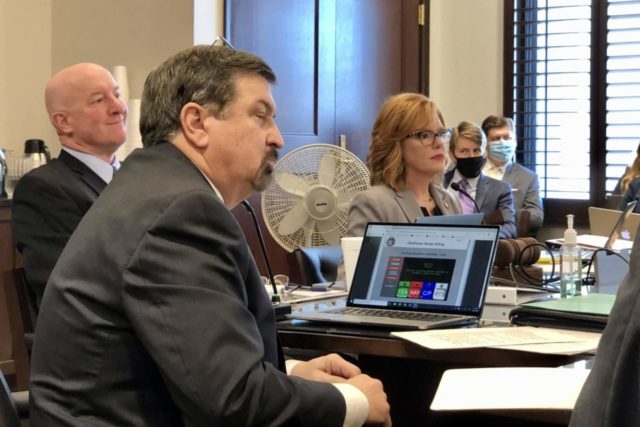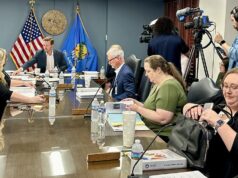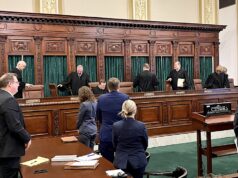
In February, the Oklahoma Legislature’s Senate Education Committee, House Common Education Committee and Higher Education and Career Tech Committee advanced 75 education bills through the first step of the policymaking process. If these measures advance from their full House or Senate floors of origin by March 11, they will move across the rotunda to their opposite chambers for more committee and floor hearings.
The following is an overview for 11 of these education bills, some of which could have an impact on areas like student transfers, state allocated school district funding and mental health training for students and teachers.
A spreadsheet with links to all of the education bills passed out of committees in February is embedded at the end of this article. But here are three things to remember: No policy proposal is ever truly “dead” until the Legislature adjourns in May; vastly different language can be amended into existing bills ; and leadership bills can be revealed and considered at any time.
Open transfer bills
HB 2673 by House Majority Floor Leader Jon Echols (R-OKC) passed out of the House of Common Education Committee on Feb. 23 by an 8-7 vote.
The bill establishes new rules for student transfer, including the authorization for students attending a school that has received an “F” on the State Report Card for three years in a row to request an emergency transfer to a private school. The measure also creates a new funding weight of 1.1 for all students enrolled in schools that have received an “F” on the State Report Card for the previous three years in order to prevent school districts that may see transfers from losing per-pupil based funding. The bill authorizes financial “transfer allowances” for such qualifying students who transfer to private schools.
HB 2074 by Sen. Adam Pugh (R-Edmond) and House Speaker Charles McCall (R-Atoka) would create the Open Transfer Act of 2021 and would allow students to transfer to a different district anytime during the year as long as the receiving district has capacity. Each school district would be required to monitor its “capacity” and report that figure to the State Department of Education. A student’s transfer would be granted for one year, and the student may continue to attend the school district each school year after with approval from the school district receiving the student.
The bill advanced off the full House floor 77-22.
SB 783 authored by Pugh and Rep. Brad Boles (R-Marlow) also proposes a statewide transfer policy. It modifies the Education Open Transfer Act to allow students to transfer to any other school district throughout the year as long as the district they are transferring to has enrollment “capacity.”
Beginning on Jan. 1, 2022, the measure would require school districts to determine the number of students it has the capacity to accept at every grade level for each school site by the first day of January, April, July and October. Districts must post this information on their websites and report it to the State Department of Education. School districts must also report its number of transfer approvals and denials, along with the reasonings for the approvals or denials, to the State Department of Education.
SB 783 advanced out of its committee with a 9-3 vote along partisan lines and awaits a full Senate hearing.
School funding changes
HB 2078 by House Appropriations and Budget Committee Vice Chairman Kyle Hilbert (R-Depew) and Rep. Toni Hasenbeck (R-Elgin) would alter how school districts receive state-allocated aid.
Rather than utilizing the current three-year enrollment high to determine per-pupil state aid for schools, HB 2078 would require funding for districts to be based on either the current year’s initial enrollment numbers or the previous year’s enrollment — whichever is higher — beginning with the 2022-2023 school year.
The December calculation for funding, midyear adjustment, would be based on enrollment totals for the first nine weeks of the current school year or the previous school year, whichever is higher.
The bill passed out of the full House 68-30 and is now awaiting a Senate committee’s consideration.
Lindsay Nicole Henry Scholarship Program
SB 126 by Sen. Julie Daniels (R-Bartlesville) would prohibit private schools participating in the Lindsey Nicole Henry Scholarship Program from discriminating on the basis of race and national origin in compliance with federal law. The program allows students with disabilities served under the Individuals with Disabilities Education Act to receive scholarship to attend a private school that participates in the program and is approved by the State Board of Education. The bill advanced through the Senate Education Committee on a 9-3 vote along partisan lines.
Pay for support employees during school closures
SB 807 by Sen. Chris Kidd (R-Waurika) would require school district support personnel to be paid for any time lost if a district were to close owing to an epidemics or other health-related issue. The bill advanced out of committee 10-1.
Increased mental health support
There were multiple bills passed out of committee that would help address mental health issues with students and provide better support.
HB 1027 by Rep. Trish Ranson (D-Stillwater) and Sen. Brenda Stanley (R-Midwest City) would require the State Department of Education and Department of Mental Health and Substance Abuse to collaborate with local school district superintendents to develop training for faculty on violence de-escalation, trauma informed teaching and response protocols centered around trauma information to address behavior with a compassionate approach. The bill advanced from the House Common Education Committee on a 13-0 vote.
HB 1568 by Rep. Jeff Boatman (R-Tulsa) and Sen. John Haste (R-Broken Arrow) would create Maria’s Law. Beginning with the 2022-2023 school year, it would require all Oklahoma school districts to include mental health education in any health education curriculum. The State Board of Education would collaborate with Department of Mental Health and Substance Abuse Services to adopt standards and develop age-appropriate mental health curriculum for grades kindergarten through 12th. The bill advanced from the House common Education Committee on a 14-0 vote.
SB 21 by Sen. Kay Floyd (D-OKC) and Rep. Marcus McEntire (R-Duncan) would require school boards to adopt a suicide awareness and training policy. School district faculty and staff would be required to undergo this training twice a year beginning with the 2021-2022 school year. The measure would also require suicide awareness and prevention training for students in grades 7th through 12th beginning with the 2022-2023 school year. The bill advanced from the Senate Education Committee 12-0 and, because it contains a fiscal impact, appears on the Senate Appropriations and Budget Committee agenda this morning.
State Board of Education membership
SB 157 by Sen. J.J. Dossett (D-Owasso) would change the service rules for State Board of Education members. The proposed legislation would move board members from serving “at the pleasure” of the governor to a status where they could be removed only for a series of causes. The bill advanced from committee by a 10-2 vote.
SB 239 by Sen. Dewayne Pemberton (R-Muskogee) establishes new guidelines and a new statewide appeal process for charter school applicants initially denied by their proposed sponsor. It also establishes a new requirement before the State Board of Education sponsors a new charter school. The bill has already advanced off of the Senate floor by a 30-16 vote.
Education bills advanced from committees of origin
